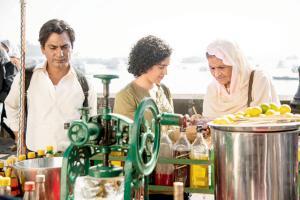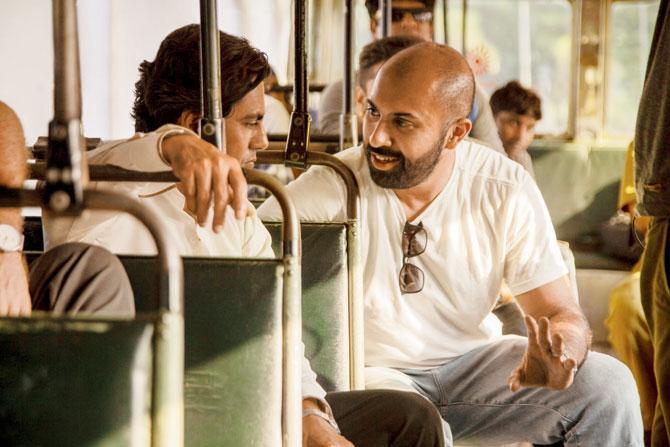Reuniting with The Lunchbox actor for Photograph, director Ritesh Batra says Nawazuddin Siddiqui seems to "play himself" in the film

A still from the film
With a screening at the Berlinale earning his leading lady Sanya Malhotra a spot on Hollywood Reporter's list of top five talents to watch out for, writer-director Ritesh Batra knows that Photograph is off to a good start. Six years after The Lunchbox (2013), Batra is back in Bollywood, romancing the city he loves - Mumbai. In a conversation with mid-day, he chronicles the importance of being a stickler for details and a seeker of local flavours.
ADVERTISEMENT
Edited excerpts from the interview:
What made you revisit the age-old rich-girl-poor-guy love story theme again?
I grew up watching the Hindi movies in the '80s and '90s on the same theme, where the man was always a motor mechanic, while the girl had a bad attitude. So, I thought, why not make a film of a rich girl and a poor guy, but one that was organic; something a viewer could actually believe. I got interested in understanding who these two people are - the characters that Nawaz [Nawazuddin Siddiqui]and Sanya play. I wrote the climax scene first, and when you see the film, you'll notice that, for me, it really became about the last scene.

Ritesh Batra and Nawazuddin Siddiqui behind the scenes
Was Siddiqui your first choice when writing the part of Rafi, or did you cast him after doing so?
Nawaz has an innate goodness about him, like this character does. Even in [my last film], The Lunchbox, he played someone who is good. That's how I see him. I'd say, he's playing himself in the movie, which is not an easy thing to do, and we don't see him doing that often. But, [casting] always comes in after the writing. There's a whole another world that's not in the trailer. Geetanjali Kulkarni, as Sanya's friend and maid, has a good part in the movie. Vijay Raaz has a special part, as does Jim Sarbh.
Can you chronicle the prep that Nawaz went through to play a photographer?
He had a photographer from the Gateway [of India] to train him on how to use the camera and printer, so it looks professional; something he does every day and is versed with. He did it for about three weeks [only], since [he] is so busy.
What prompted Malhotra's casting for the character of Miloni?
I saw her in Dangal (2016), and thought she was great. I sent her the script and she was wonderful in the audition. Sanya is a meticulous and talented actor. She says a lot with her silence. That's what we needed for this part.
Highlighting the importance of paying heed to details, you'd once stated that the more local a film is, the more universal it would be. How do you capture the flavour of any place?
In Photograph, we spent time figuring out where these people would live, and what they would wear. Even when shooting the scenes involving [Miloni's] apartment on set, we stayed true to the dimensions of an actual apartment. We wanted [to experience] the restrictions of working in a real space, even though we were on set. We focused on small details, like the bus they would take, or what the conductor would say. The more local and specific the film is, the more it will matter.
When filming in a city [I know little about], I'm always worried about getting it [details] right. There's an investment of time and effort that is done. When I made Our Souls At Night (2017), I spent a lot of time in Colorado, understanding the place and locations where we could believably set the scene. Fortunately, a lot of the core scenes of the movie were in a bedroom, but, even the things they talk about, their lives, and past, [must reflect] the city. So, understanding a place and its rhythm is important. I don't know if I always get it right, but I try.
You've often chronicled your love for Mumbai. What part of the city makes you nostalgic?
What I love about the city, and what's also in the movie, is how the old and new co-exist. This doesn't happen in a lot of other cities. Like in this film, Nawaz's character is a photographer who prints photos and gives it to people. That still exists in the city today, even while you have people taking photos on phones.
Do you think that with both, The Lunchbox and this film, you are shattering the stereotype of a quintessential romantic hero in Bollywood?
It is important that people watch films in theatres, so, I appreciate the role of commercial cinema. It serves a lot of purposes. In the West, people have stopped going to theatres. But, commercial films drive people to cinema halls here, and that is something that must happen. Also, if everyone made the same films, it would be boring. It's nice that people can watch something this week, and something entirely different in the next. When The Lunchbox did well, I was happy, and surprised, but also knew that one movie wouldn't change anything. But last year, many small-budget movies have succeeded.
What would you say is the toughest part of surviving in this industry?
Doing what you love to do, consistently.
What would you say has been your biggest evolution as a filmmaker?
I've learnt how tough it is to adapt, and have become better at it. Also, I believe that if I'm not working, I'm at sea. It's important to keep working. If you get a chance to do something you enjoy, you should keep doing that. Write the film you love and try to get it made. The business of sitting and waiting for the perfect script isn't one I believe in. That's something that's change in me.
What is the most difficult part of pulling off an adaptation?
I gauge that a novel is prose, but a film is a poem; it is a visual poetry. So, how do you translate that? When it works, it is beautiful. The process of doing so needs enough time, so people must take the two, three or five years that it takes.
Films adapted by Batra
The Sense Of An Ending: The 2017 American drama featured Jim Broadbent and Charlotte Rampling, and enjoyed its world premiere at the Palm Springs International Film Festival, that year. It was adapted from Julian Barnes's novel by the same name.
Our Souls At Night: With a world première at the Venice Film Festival, Our Souls At Night opened to a rousing reception from the word go. The Jane Fonda and Robert Redford starrer for Netflix, was adapted by Kent Haruf's book by the same name.
Also Read: In the modern age, relive old school romance with 'Tum Ne Mujhe Dekha' in Photograph
Catch up on all the latest entertainment news and gossip here. Also download the new mid-day Android and iOS apps to get latest updates
 Subscribe today by clicking the link and stay updated with the latest news!" Click here!
Subscribe today by clicking the link and stay updated with the latest news!" Click here!






